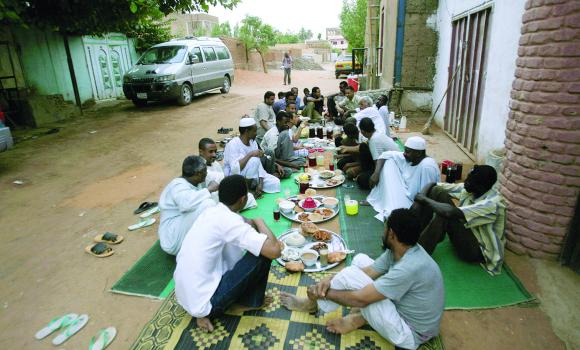MADE IN SUDAN: A healthcare system in shambles
If you were born in Sudan then you most probably have a scar on your left arm. It is the result of a vaccine against tuberculosis that you received as an infant. Initially, I didn’t know why a scar should be left after a vaccination; particularly such a conspicuous one. Naturally, I rushed to blame the incompetent doctors of Sudan and the country’s deteriorating healthcare system. However, I later on discovered that the scar is a perfectly normal reaction to this vaccine. This made me realize that my brain has an automated response when it comes to anything related to the healthcare industry in Sudan.
I came to learn at a very early age that in Sudan, medical errors are common and they can hinder the course of someone’s life to the extent of physical disability. As a kid, I was relentless to find out why my aunt walked with a limp. Of course now I realize how insensitive my childhood inquisitiveness was, but at the time I made it my mission to find out what the problem was. Deluded as I was, my juvenile naivety had me convinced that if I knew what was wrong I could subsequently fix it, somehow. When my snooping became too bothersome, my mom finally sat me down to explain my aunt’s condition. She told me that the limp was the consequence of a vaccine gone wrong, and that it cannot be repaired or reversed. She added that it will probably cost my aunt the normalcy of her life. I was baffled. Ultimately, I came to the realization that I can’t fix her. Ironically, here I am eighteen years later, still trying to fix the pieces of my broken country.
When I came to Sudan to do my undergraduate studies, I was optimistic that things within the healthcare realm had changed. Unfortunately, reality struck even before my graduation. I would constantly hear of relatives dying because of overdoses in anaesthesia, the surgeon leaving behind a piece of gauze during the operation, or the nurse forgetting to administer a certain post-operation pill. After graduation, the grass was not at all greener. It was as though I had been seeing the world in blurry mode and I was suddenly handed a pair of sharp-vision glasses.
The healthcare system in Sudan is not only riddled with incompetence, but corruption as well. However, I wish these were its only two problems. Patients die every day because they can’t afford medication or treatment.
Today, health is a commodity that doctors, healthcare professionals, salesmen and businessmen use for trade. I call myself a biomedical engineer, but at the end of the day I am just one of them.
Conversely, I made a vow to myself; I will get out before it’s too late.





Many incidents, which lay-people may accurately or inaccurately, refer to as medical errors, arise from lack of communication between medical practitioners and their patients. Your scar story is one of them. I had worked in Sudan, and I can confidently say, communication between doctors and patients is not optimum. This has created a vacuum in information that allowed for many misconceptions about doctors and the health system in Sudan, and subsequently lead to inaccurate and sometime even unfair labelling. I am not in the specialty of Anesethia but I did work in Surgery for over a year and I don’t seem to be familiar with a “post-operation pill”, not doubting that’s how the author heard the story but I am just emphasizing that not everything that goes wrong with a patient is due to medical error or negligence, and definitely not everything you hear is true. Unless an inquiry and/or an expert opinion’s review has been carried out, and unless family/victims do pursue an inquiry or an autopsy, the accusations from both sides will continue unfounded, which in my opinion, could have been avoided in patients and their families are made fully aware of the limitations in treatment or the complications of a procedure. And I admit, again, that doctors in Sudan come up short when it comes to communication and I also have to agree with the author that the public medical healthcare system in Sudan is indeed in a dire need for reform but having said that, I must now remind the author and everybody who is reading this, that the doctors of Sudan, and for a long time, were the only professionals who stepped up and called for reform. They even went further and took industrial action which was met by the brutality of the NISS who went as far as detaining and torturing some of the members of the committee they formed as a parallel body to the incompetent non-representative government-controlled union. They went through all that without any support, worth mentioning, from the public. Indeed, the public stood there and watched doctors call for reform and betterment of work conditions and quality of service, they watched them getting beaten, captured and tortured and yet did absolutely nothing, yet the public finds it easy to blame them.
The whole public sector is in shambles, why expect healthcare to be any different?
Dr. Amin,
Would you be kind enough to contact me on my email address.
Thank you
Dr. Amin Bahari, great reply, this is exactly what I wanted to say. When i was a medical student I was told all those stories and I beleived them and spread them as well. Now that I am a doctor and now that I have been practicing medicine here in Sudan, the picture I have drawn in my mind is completly different. Obviously there are medical mistakes, but these happen everywhere, a doctor is a human being. The problem is, like Dr. Amin said, there is a communication issue in Sudan. The patients and their families are not properly counselled about their illnesses and what to expect. In Sud
In Sudan this is because (I have recently learnt this) patients flee when they know the truth, they seem to prefer living in the dark. Also, all those gauze stories, people need to understand there are people in the O.R who’s repsonsability is to count the gauze as the surgeon works. The surgeon’s job is to DO the surgery, to fix whatever needs to be fixed, to keep the patient stable. NOT to count gauze. This is the mu7adereen’s job. So if he leaves a gauze somewhere in the abdomen, the mu7ader should have noticed a missing one. Also, anaesthesiologists who over dose patients is another common story that is spread by patients. Al”ayin galu ma si7a min alanaesthesia. This is a complication of anaesthesia. A patient can die, they can develop an allergy to the drug and they can simply not wake up. These are known complication. The problem in Sudan are not the Paramedics or those who work in the health system. It is those who manage it. So efforts should be made to change that first.
Thanks Amira for your insights about the problem, sorry i’m 3 and a half years late! the problem with the healthcare system in Sudan in my view is that its riddled with poor management and leadership in addition to corrupt practises committed by some doctors, who are pure ‘businessmen’, They have no sympathy whatsoever for the plight of poor patients, the majority (mainly senior ones) are corrupt, deceitful, unprofessional and greedy, the reality is that, is they have become role models for the younger generations sadly; and we can agree to disagree, but as a Surgeon or Anaesthetist, you are after all responsible for the wellbeing of your patients, hence accountable for your mistakes and the mistakes committed by members of your team.
The Sudanese health system is flawed and corrupted, I would agree. However medical errors are only one-shocking but relatively infrequent- result of the huge gaps and defects in this system. And more importantly it is often an error of a system, not a doctor.
Sudanese doctors have been and will always one of this country’s underestimated assets. The competence of the vast majority is beyond question, so is their veracity.
Why do medical errors occur then?
First of all, to be clear, I am not referring to the scientifically expected rate of human error in health service delivery. I will explain why the Sudanese health system produces services that are substantially more risky for clients with much higher rate of medical error than the anticipated.
In Sudan the medical errors are a result of a cruel system that exhausts motivation, physical and mental capacity of doctors and nurses day in and day out. While practicing in one of the busiest Sudanese Obstetrics and Gynecology hospitals I learned many of the operational flaws in the health system-I learned them the hard way.
A team of ten to fifteen doctors would work in the emergency department for at least thirty hours straight, serving around 100 deliveries, 10 emergency C-section, at least 20 cases of abortion complications, and a selection of all medical and obstetric complications. One normal uncomplicated delivery woman requires at least four contact hours, one C-Section requires at least 7 hours from preparing her for the operation until she can be safely left in her ward with subsequent hourly supervision; one abortion case would require at least 3 hours. I am just a doctor, YOU do the math!
I worked there and watched colleagues and friends literally collapse, fall sick, go into severe depression, lose faith and some-Quit!
This specific hospital I referred-to, have one of the most welcoming and appealing environments. At least, there is continuous education program, and supportive management. The situation is far worse in other facilities.
After the first twenty hours of hard work without a break, the only thing that would prevent any practicing doctor from forgetting gauze inside a woman’s abdomen-would be luck! And as we know, luck is not exactly the greatest asset of Sudanese doctors. For us it was the fact that we were taught and trained by men and women who made us believe that-we are super humans, we are angels against all the bad in the world , and we shall (and more importantly HAVE) to make it work no matter how bad it gets! And that-as noble and heroic as it might sound- was the first of many wrong beliefs injected to our heads. We were never trained to problem solve, never knew our rights, and never demanded the ones we knew. Doctors are service providers and if that service is missing, then there is nothing to be provided! And No doctor should be held accountable, but we all know that’s not how it goes.
I had a horrifying personal experience with Sudanese doctors. But now being one of them, I am at peace. I know now that if a Sudanese doctor “intentionally” implanted-not merely forgot-a dirty gauze-or a rusty knife for that matter-inside my brain, that it is Neither their intention, nor their fault! Mostly!
I also believe, being one of them, that this corrupted and broken system WILL be mend and one day, not too far from now it will be taken over by fair, skilled, educated, and passionate people. And I believe that this health system will one day produce services that will match the greatness of the hearts of its doctors.
Some say I am romantically delusional! I say-a famous internal medicine quote: WAIT AND SEE!